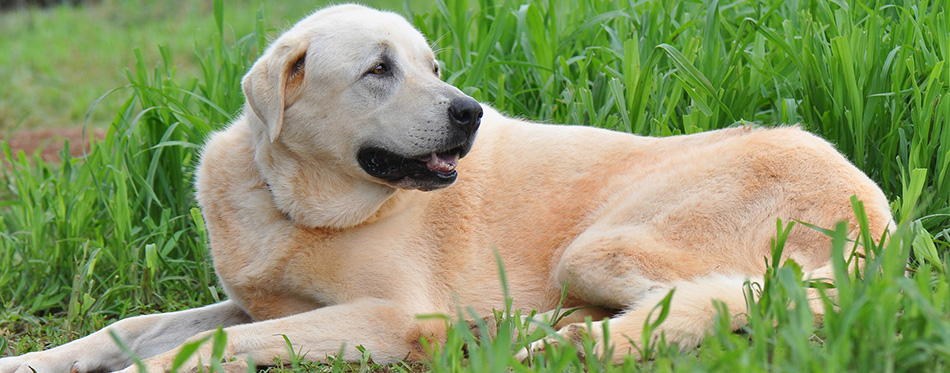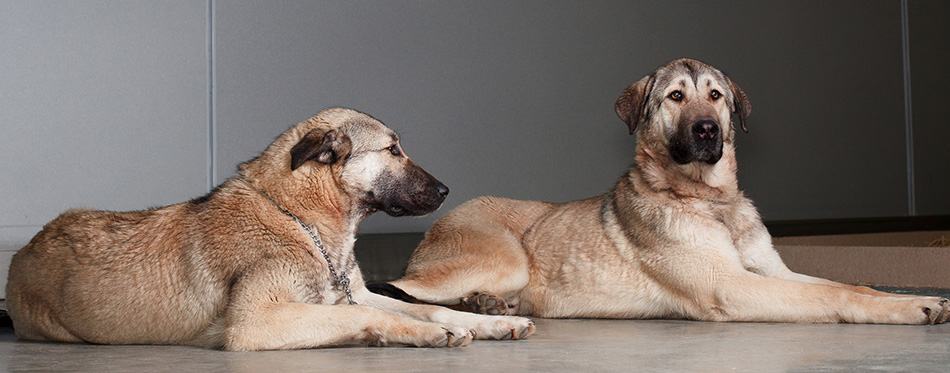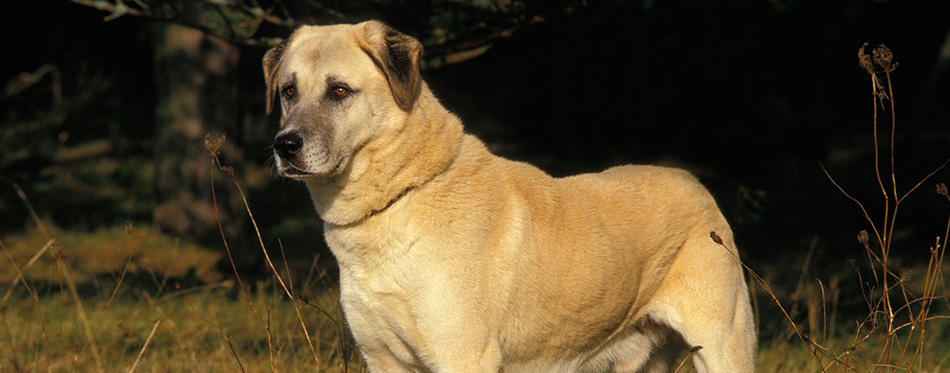Rugged, protective and down to earth, the Anatolian Shepherd Dog is a giant of an animal that has an in-built loyalty to its human pack. Originating from Turkey, this large dog was bred as a shepherd’s companion and its instinct to protect remains a dominant force behind its personality. While not your average family pet, the Anatolian is a large and impressive breed that loves to work as well as roam. But he is also a kind soul that will be content to curl up at your feet, after a hard day’s protecting his home patch. Perhaps not suited to a first-time dog owner, the Anatolian would make a super companion to someone more experienced and who can work around his ‘guard and protect’ instinct.
Also known as the Turkish Shepherd, we take an in-depth look at the Anatolian Shepherd dog to discover just what makes this majestic and rare breed tick.

History of the Anatolian Shepherd
Hailing from the Anatolia region of central Turkey, the ancestors of the Anatolian Shepherd dog is thought to date back to 2000 BC, when wandering tribes from central Asia brought with them a mastiff-type working dog. This dog adapted to the rough terrain of Anatolia and the nomadic herding life, to become known as the ‘coban kopegi’ which is Turkish for shepherd dog. Used to herd and protect flocks of sheep and goats, the Anatolian Shepherd developed to become fast and strong, to enable it to protect its wards from predators, both day and night. The Turkish Shepherd dog was also left to its own devices and was rarely fed after puppyhood and so had to feed and defend itself while looking after its flock in all weathers and seasons. Hardworking and extremely tough, the result was a dominant and independent-minded animal that was well-suited to its daily, nomadic life.
The Anatolian Shepherd first arrived in the US in the 1930s when the breed was gifted to the US Department of Agriculture by the Turkish Government to be developed as a ranch dog to protect flocks of sheep. The breed was welcomed due to its unique ability to scare off predators without harming them, especially beneficial in the US when it came to protected species such as the wolf. In 1970, the Anatolian Shepherd Dog Club of America was formed as their popularity grew and the breed was eventually recognized by the American Kennel Club in 1996.
Quick Facts About the Anatolian Shepherd
Serious, strong and with a tendency to dominate, the Anatolian Shepherd Dog is no lap dog but for the right family, he has a lot to offer and can make an awesome companion. Here are a few of the ‘must-know’ facts about this fascinating breed:
- They are top dog in Turkey: The Anatolian Shepherd is Turkey’s official national dog and is still used today for herding and guarding flocks of animals, thanks to their ability to defend livestock from wolves, coyotes and other predators.
- They are independent thinkers: Originally left to their own devices as guard dogs in Anatolia, the Turkish Shepherd dog is used to making their own decisions, a trait that remains in the domestic breed today. This means early socialization is needed so the Anatolian can make the right choices when it comes to what they perceive as a threat as they are naturally wary and suspicious of strangers and strange situations.
- They can weigh up to 150 pounds: Anatolians are substantial and powerful dogs, with long limbs and a large, heavy head. Well-proportioned, he should have a thick neck and deeply muscled body, with a long tail that distinctively curls at the end – this curl will tighten up even more when he is on high alert.
- They have a coat of many colors: While their coat is short, it is known for heavy shedding, especially in the spring months and he will also have feathering on his ears, leg, and tail. While fawn with a black face mask is the most common color for the breed, the Anatolian can come in eight recognized colors, including pinto, blue fawn, liver, and white. The brindle Anatolian Shepherd is also popular.
- They have a serious side: As a breed, the Anatolian is not the most playful, even as puppies and they are known to take their job as shepherd dogs very seriously, even if they are not working as one. However, in a loving, disciplined family, even the Anatolian can have their daft moments.
- Anatolians are champion diggers: With a desire to roam and protect their outdoor space, the Anatolian Shepherd Dog is driven by an instinct to protect and are adept at digging their way out of a situation. This means that not only do you need a fence or border that is high enough, but it also needs to go deep enough in the ground to stop your pooch from escaping. Find out more about electric dog fences here.

Things You Should Know
As a relatively rare breed in the US, an Anatolian Shepherd puppy will set you back between $800 and $1,500. And, with an average lifespan of between 13-15 years, you also need to factor in the expense of feeding and caring for this large canine throughout its life. If you think that the Anatolian is the dog for you, we’ve put together a list of all the essential things you need to know.
Health
Large, physically imposing and hardy, the Anatolian Shepherd is considered a healthy dog but can be prone to a few conditions and diseases you need to be aware of.
- Hip and elbow dysplasia: these are both degenerative conditions causing pain and lameness as well as arthritis long-term. Hip dysplasia is an inherited condition which can be DNA tested for and is a result of the thigh bone not fitting correctly into the hip joint. Elbow dysplasia is thought to be caused by abnormal development, resulting in a weakened elbow joint. Treatment can include surgery and anti-inflammatory medication while managing a healthy weight is essential.
- Entropion: This is a painful eye condition that sees the lower eyelids folding inwards, causing irritation and potential vision impairment if left untreated. It is typically seen in Anatolian Shepherds before the age of one and treatment will involve corrective surgery.
- Demodectic Mange: Passed from mother to pups, this skin condition is caused by the demodex mite, which live in the hair follicles. These mites usually remain symptom-free unless your dog suffers from a compromised immune system when they can develop demodectic skin mange. Characterized by patches of red, scaly skin and hair loss, typically on the head, neck, and legs, this mange is mainly a puppy disease and should clear up on its own, but in young adult dogs can go on to cover the whole body and will need treatment.
- Hypothyroidism: Caused by an underactive thyroid gland, this disorder can cause a host of symptoms and conditions, including obesity, lethargy and hair loss and is usually treated via medication and diet.
Anatolian Shepherd dogs are also known to be sensitive to anesthetic, so always discuss this with your veterinarian if surgery or treatment requiring anesthesia is planned.
Training
With their instinct to guard and herd, the Anatolian Shepherd is a dominant dog that will need early and consistent training to ensure he is socialized and not overprotective or aggressive. That said, with the right training and clear boundaries in the home, the Anatolian can make a loyal and caring pet, but they do need a strong and fair human as their pack leader. The key to a happy Anatolian pet is for them to know and understand what is normal and what is a threat, as their natural instinct is to guard and protect. Untrained and unsocialized Anatolians can become overprotective and uncontrollable as they mature.
With their stubborn and strong-willed nature, Anatolians also need more intense training than many other breeds and their instinct to guard cannot be totally over-ridden so they are not suited to first-time dog owners or families that are looking for a non-guardian type of pet. This breed will never be the over-the-top friendly type, but with the right handling and consistent training, they will make a wonderful companion for the right person, who can work with and respect the independent spirit of the Anatolian Shepherd Dog.

Exercise
For their size, the Anatolian Shepherd is considered to be a medium energy dog so doesn’t need excessive exercise as he is also known to be ‘self-exercising’ due to his desire to roam. This is a breed that needs a lot of outdoor space so if you only have a small backyard, this is not the dog for you. Aside from around an hour or two walking with his human, the Anatolian will up his daily exercise quota out in your large garden, prowling and pacing as he protects his land. When it comes to forms of exercise, the Anatolian is a fuss-free animal who doesn’t go for games but prefers to go on a straightforward walk with his human. Just ensure he is trained to respond to the heel command, or he just may walk off without you, when off the leash.
Nutrition
This is a large breed that needs the right amount of nutrition to develop and sustain its energy levels and health. The Anatolian dog is not a fussy eater but providing him with around 3-4 cups of high-quality food will ensure he stays in optimum health. Feed your Anatolian twice a day at consistent mealtimes and make sure his diet contains a premium protein, particularly if you are feeding them a dry kibble diet. You may also need to up their quantity of food if they are a working dog and check their diet for additional supplements and nutrition to maintain their overall health and mobility. When it comes to treats, try to avoid processed, over the counter chews and treats, but opt for more natural titbits, such as fruit and vegetables.
You may also like our articles on Dog Chews and Dog Treats.
Grooming
Although they are a relatively short-coated breed, the Anatolian Shepherd Dog is a hair monster when it comes to shedding, especially in the spring so it is a good idea to get into a regular grooming routine during their shedding phases to help remove all this dead hair. Otherwise, the Anatolian is a naturally clean breed and will require minimal bathing of around three times a year. However, as an outdoor dog, it is essential to maintain a regular flea program to prevent any infestations.
As well as his coat, you will also need to care for his oral health, so regular teeth cleaning is a must to prevent any gum disease. Also, check his ears weekly for any signs of redness or bad odor that could indicate an infection. And finally, if your pet is not wearing them down naturally outdoors, you will need to get his nailed trimmed at least once a month.
You may find the following dog grooming guides interesting: dog wipes, medicated dog shampoo, dog shampoo, dog paw washer, dog nail grinder, dog nail clippers and dog grooming gloves.
Temperament
If you are looking for a soft, cute, pliable and playful pet, then the Anatolian Shepherd is perhaps not the dog for you! These are independent and strong-minded animals that are highly intelligent and like to dominate, so will not necessarily be cuddling up with you on the sofa. But if you are looking for a physically active, hard-working and calm dog that likes to protect its pack, then this could well be the dog to choose. But you do need to know what you are doing and be able to offer a stable and consistent home life with plenty of space for your new pooch to roam.
The Anatolian’s desire to guard and protect dominates his temperament, which makes him wary of strangers and new situations. He will also be very protective of his human family, which he will consider to be both his pack and his flock, and it is his duty to look out for them. There is also a strong-willed and independent trait in the Anatolian which needs an equally strong, but calm and kind human pack leader to keep it in check. But with the right training and early socialization, the Anatolian Shepherd will make a loyal pet and can be playful and gentle with his human family. However, due to his size and strength, as well as his herding and guarding instinct, the Anatolian is not suited to a family with young children as he can get a bit boisterous and dominant. They are also not good for living in closed environments so are best suited for homes with substantial indoor and outdoor space, where he has the freedom to roam and spend time by himself. But for the right person, with the right attitude and dog experience, the Anatolian can make a rewarding and loyal friend.
Sources:
- The Anatolian Shepherd Dog – ASDCA
- Anatolian Shepherd Dog – AKC

